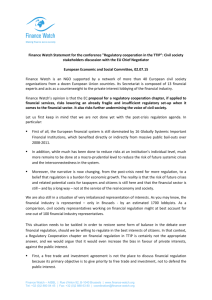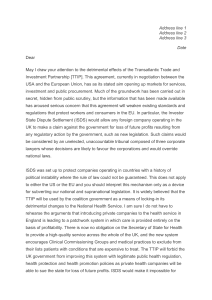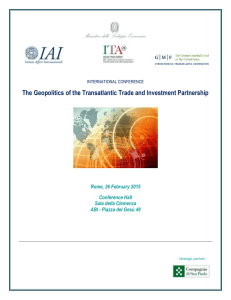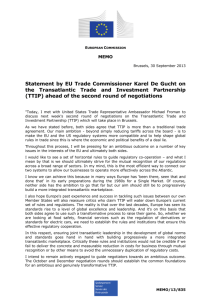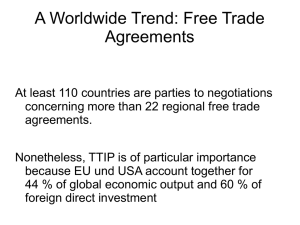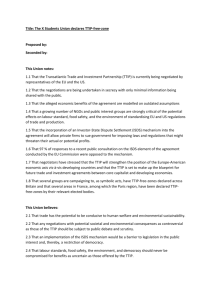TITLE OF The EU, Investment RESEARCH PAPER Protection and TTIP
advertisement
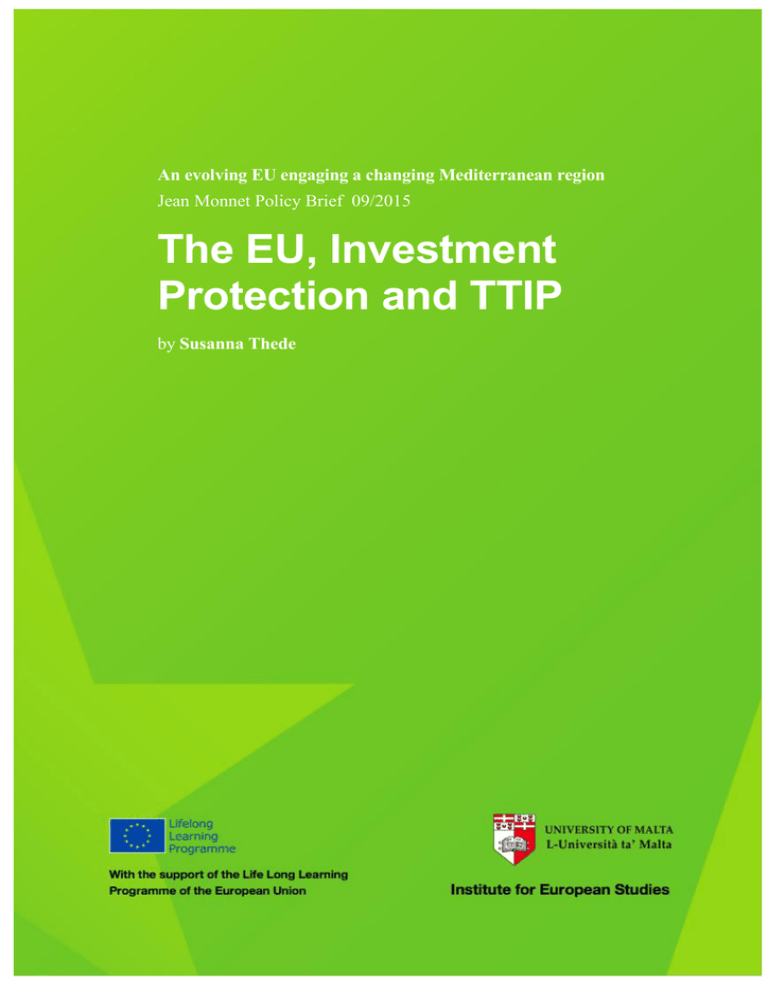
Name of project An evolving EU engaging a changing Mediterranean region TITLE OF The EU, Investment RESEARCH PAPER Protection and TTIP Jean Monnet Policy Brief 09/2015 by Name of Author by Susanna Thede Policy Briefs Policy briefs should be submitted to Professor Roderick Pace, Director of the Institute for European Studies, at roderick.pace@um.edu.mt. They should not exceed 3000 words including references, which should be kept to a minimum. The JM Policy Briefs do not necessarily reflect the views of the Institute for European Studies but those of the author. This project has been funded with the support from the European Commission. This publication reflects the views only of the author, and the Commission cannot be held responsible for any use which may be made of the information contained therein. Grant no. 2012-2690. The EU, Investment Protection and the TTIP On May 6, EU trade commissioner Cecilia Malmström went to the International Trade Committee (INTA) of the European Parliament to discuss a reform proposal for the investor dispute resolution to be incorporated into the Transatlantic Trade and Investment Partnership (TTIP). The proposal was outlined by the commissioner in response to increased opposition to the current investment protection system with the aim of agreeing on a basis for discussion to establish what could be proposed in the TTIP negotiations with Parliament’s consent. The proposal served as a step to enable the commission to eventually negotiate far-reaching investment protection legislation. EU member states are already participating in 1400 international investment agreements, most of which suffer from deficiencies targeted in the TTIP debate. During the meeting, many members of the committee emphasized the need for reform to prevent the same form of investment regulation from being incorporated into the TTIP agreement. Their fear is that the regulation can be abused by corporate interests. An example is provided by Joseph Stiglitz (2015): Law suits have been started in Australia and Uruguay by Philip Morris against new legislation mandating more explicit cigarette health warning labels. The investor protection dispute mechanism is only one of many controversial aspects linked to market integration through the TTIP agreement. The only way for EU citizens to influence what is brought to the bargaining table is through Parliament and it is not surprising that anti-TTIP sentiments are taken up by many members of the European Parliament (MEPs). These concerns should not be taken lightly as the negotiations require compromises for the agreement to be eventually approved. Indeed, there is overwhelming evidence that trade policy is strongly influenced by private sector interests. As clarified by Richard Baldwin (2014), today’s globalised production processes leads to political pressure to deepen trade liberalisation because firms are global profitmaximising actors that gain from minimising transaction costs in international production networks. From this viewpoint, the main impetus behind the TTIP negotiations comes from political pressure led by the private sector. It is well-established that market integration leads to increased competition that results in price reductions and increased product variety. The enhanced competitive pressure favours firms that are more productive who gain from expanded market access at the expense of less productive firms. Overall, this increases industrial productivity. It is also clear that market integration expands that type of production which is internationally competitive and contracts other forms of production. This stimulates economic activity and job creation. There is no reason to expect the TTIP agreement to be different from other deep trade agreements in this respect. The bulk of trade creation from the TTIP would occur in services, where stark impediments to trade remain to date. For the EU and US economies, which are highly competitive in services, it is considered to be of central importance to liberalise trade in services to spur economic growth. Since the USA and EU have been unable to strongly enforce this goal in the World Trade Organisation (WTO), the establishment of a TTIP agreement can be interpreted as a modified market-opening strategy. By joining forces and creating an economic super power, the agreement can be expected to give the thrust needed to liberalise international services markets as countries outside the TTIP will want to ensure producer access to the EU-US market. The nature of services’ trade implies that liberalisation clears behind-the-border barriers that have not traditionally been regarded as trade barriers. This necessarily involves the modification of national regulations and/or their implementation. One example is government procurement, which is tailor-made for domestic producers, that inhibits foreign investment. It is clear that the investment protection system needs to be changed. The European Parliament’s resolution on TTIP not only backs the trade commissioner’s reform proposals but further proposes that a public International Investment Court should be established in the medium term. This resolution, which was approved by the Parliament on July 8, provides negotiators with a strong mandate. One of Malmström’s main aims as exemplified by her proposal is to work towards establishing a permanent multilateral system to handle investment disputes, which would in turn become a welcome step to ensure a transparent system that could create a ‘fair level playing field’ to enforce liberalisation of behind-theborder investment barriers. If carefully planned, such a system could work to regulate investor and state behaviour and create gains for all much like the WTO (and former GATT) system has functioned in removing border trade barriers. While it is questionable whether the regulatory standards attained through TTIP would be well-suited to building a framework that safeguards the interests of members and non-members alike, EU-USA leadership in working towards the goal of creating a multilateral, transparent system to liberalise services trade may be the only way to realise the extensive reforms needed to counteract corporate abuse of the investor protection system. References Baldwin, R. (2014), ‘Multilateralising 21st Century Regionalism’, Global Forum on Trade: Reconciling Regionalism and Multilateralism in a post-Bali World. Paris: OECD. European Commission (2015), ‘Investment in TTIP and Beyond - the Path for Reform.’ Concept paper outlining the TTIP reform proposal drawn up by the EU trade commissioner. European Parliament (2015), ‘Recommendations on TTIP.’ Report prepared by the International Trade Committee containing the European Parliament’s recommendations to the European Commission on the negotiations for the TTIP. Stiglitz, J. (2015) ‘The Secret Corporate Takeover.’ Project Syndicate column (May 13th). Web sites EPTV. The European Parliament web streaming portal. http://www.europarl.europa.eu/eplive/en/schedule.
